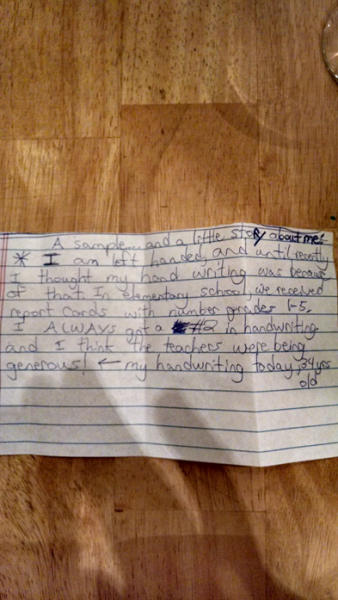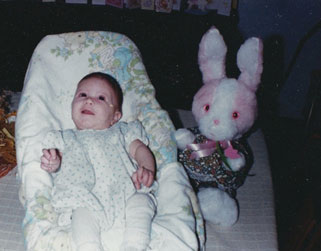Do I Have Fetal Alcohol Effects?
I once wrote a letter to a Dr. Shur, who is a pediatric geneticist, in hopes of finally getting a definite answer to my question of if I had Fetal Alcohol Effects, which is one of many Fetal Alcohol Spectrum Disorders. Even though I’m 34 years old and a functional working wife and mother, I believe that a diagnosis could lead to strategies the be more effective as a parent, wife, daughter, and employee. I do not want to struggle as much as I have been, and I want to decrease my impulses that have negative effects on me and those around me. I am hopeful there is a way to determine if FASE is a factor in my lifelong challenges. I sent the list below to Dr. Shur as reasons my neurologist, primary care doctor, and therapist thought I might have Fetal Alcohol Effects.
Biological Mom’s history:
1. Biological mom: chronic alcoholic who drank every day while pregnant with me. Rarely ever sober, according to friends. In fact, she had been drinking when she delivered me.
2. She died in 1999, and her autopsy report revealed her liver was moderately impaired by alcohol and the resulting diagnosis was she suffered from chronic alcoholism. Her blood alcohol level at death was .347.
Physical:
1. My birth weight was 6 lbs, 14 oz.
2. My pediatrician diagnosed me as “failure to thrive.”
3. My height and weight gain wasn’t at a fast enough rate according to growth charts.
4. My birth mother was 5’ 10” tall and my biological father was 6’1” tall, but I am only 5′ 3″ (almost).
5. My pediatrician mentioned possible Fetal Alcohol Syndrome based on my chronic illnesses of ear infections at two months, bronchitis once a month for the first year and a half to two years, failure to thrive, and physical characteristics. I was tested for cystic fibrosis and endocrine studies. Both were negative.
6. I had a thin upper lip, a flat face, droopy eyes, a short nose with a low bridge, and a little head as an infant.
7. I have toe hypoplasia found in my pinkie toes. Because of alcohol exposure, the toenails do not fully develop.
8. I have had horrible vision since I was a toddler (20/600 in both eyes), which can be a consequence of drinking alcohol in excess while pregnant.
Learning:
1. Fine motor skills: cutting shapes and straight lines, and my handwriting is that of a first or second grader:

2. Throughout school, when I received textbooks and would read chapters, I would highlight every line; I didn’t know how to figure out what was important. Same with taking notes.
3. When I write notes in a class, I often write down incorrect information.
4. I was so confused as to how to write an outline in elementary school, and even now. What goes where?
5. Report writing: rambling, and confusing for others to read. Graduate school: I failed the diagnostic report because of how I wrote and was asked to leave the program in my first year.
6. In college, I needed professors to assist in organizing notes and lesson plans. I struggled with applying knowledge to practicums. I was tested by a speech pathologist for learning disabilities. The results came back with poor ability in organizing my thoughts and ideas.
7. Student teaching: Very difficult for me to plan a teaching session. Too much planning to execute.
8. Following oral directions and reading maps are difficult. I often take wrong turns. I can’t remember the way to a place five miles away from my house until I do it repeatedly (five times or more).
9. My memory for minute details is amazing.
10. I struggled in school with reading a ruler and an analog clock. I still struggle reading a ruler.
11. Word problems: same steps to get to the answer, but confused by different scenarios.
12. Not strong at prioritizing events.
13. Weak at remembering what to bring when going on a trip ( don’t think of important things like diapers and wipes)
14. I often do not think to write down dates of appointments. When I do write them down, I often get the dates and times wrong. This effects my work and home life.
15. Microsoft Excel: forget it. At work we have graphs and charts. . . I get so confused
Emotional/Social:
1. Impulsivity: throwing items in the garbage without thinking it through, booking flights without looking at the calendar or discussing with my husband. I struggle to slow down and take my time with proofreading and in daily activities. I am a compulsive picker of acne.
2. I jump from one topic to another when speaking.
3. I get overwhelmed when in a big setting like the mall or Walmart, I can’t make a decision as to clothes to buy or where to start when grocery shopping. Easily distracted by everything on the shelves.
4. Sexual impulsiveness, promiscuity, and infidelity: When dating a teacher twice my age at 17, I didn’t see what was wrong with it. I jump into intimate relationships very quickly without thinking about consequences.
5. Immaturity. Sometimes, my behavior and reasoning are not what should be expected for my age: I tell everyone everything (personal things), even people I barely know, and I struggle with personal boundaries. I stare at people I do not know, and if someone talks to me, I try to be their best friend and invite them to hang out after speaking for only five minutes!
6. Incessant chatter: Ever since I was little I have talked to myself. I hold conversations for both sides to myself. I know nobody else is there.
7. Sleep disturbances: Night terrors started when I started graduate school and increase with stress. Through elementary school I used to not be able to fall asleep until around 1 or 2 am.
8. Irritability. Zero to furious in seconds. Feelings of being overwhelmed. I yell at my kids one second and hug them the next.
Dr. Shur decided to take my case. She is the head of the Division of Genetics in the Children’s Hospital at Albany Medical Center. She specializes in the causes of birth defects and developmental issues, a concept known as dysmorphology. I am hoping for a concrete diagnosis. Every day I find myself more in tune with my struggles that are due to Fetal Alcohol. I find myself going back to my childhood, and realizing how many aspects of my life were not me just being “weird.” There was a cause, and the effects could’ve been prevented. As I got older, I thought some of these effects were due to my having been adopted and feeling “out of place” as some adoptees do. I thought my compulsive need to befriend strangers immediately after meeting them was my desire to feel wanted and loved, which I attributed to adoption. I always thought the reasoning made sense, but I continued looking for a more cohesive reason to explain my behavior.
Below are a couple photos of me as an infant:
Rebecca at 1 week old, flat nose

Rebecca 1 month old, flat face, thin upper lip






